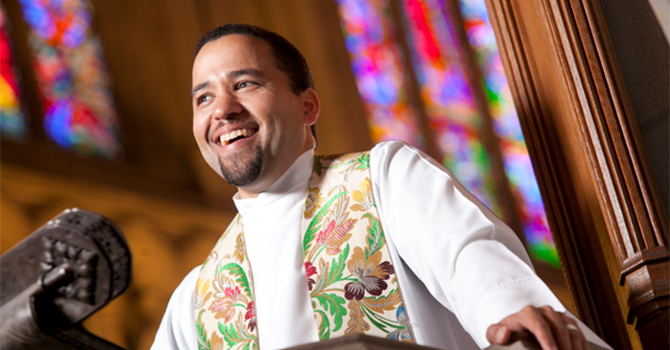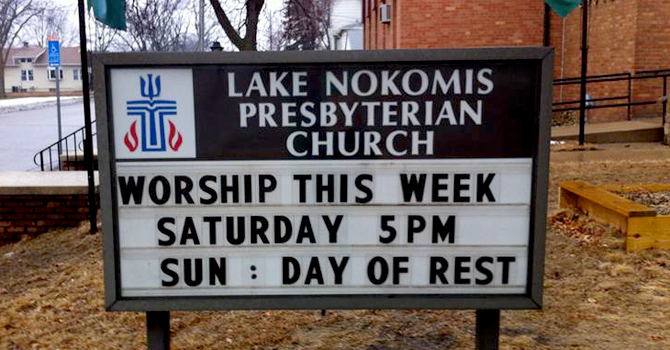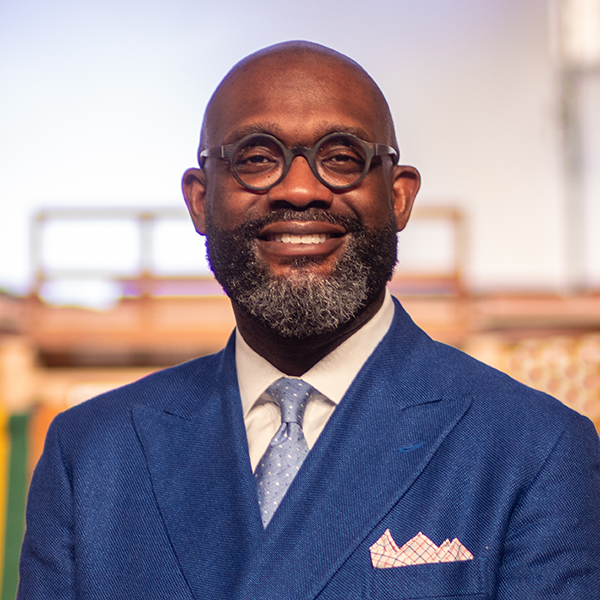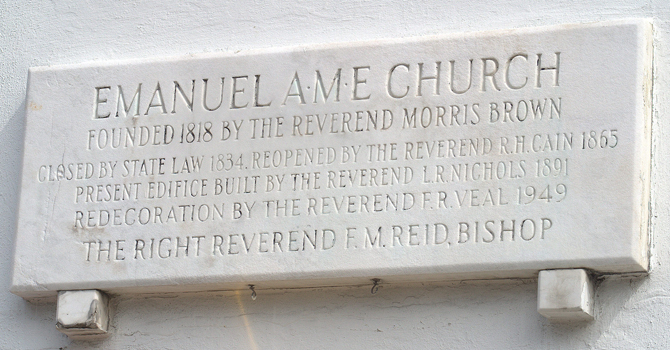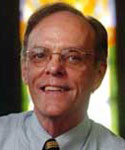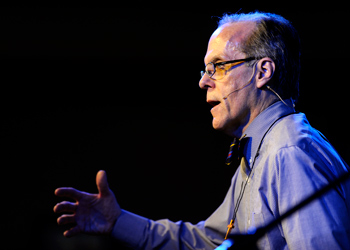2 Corinthians 12:1-12 ; Mark 4:26-32
Editor’s note: Faith & Leadership offers sermons that shed light on issues of Christian leadership. This sermon was preached May 11, 2010, at a summer field education commissioning service at Duke Divinity School.
Every seminary has its buzzwords, those terms or phrases that express certain ideas or ideals so central to an institution’s identity that they become mantras. Of all the words, one has a privileged place in the Duke Divinity lexicon: “virtue.” It would be hard to be on Duke campus a single week without hearing someone pontificate on the subject of virtue. In church history and Christian ethics, you are taught that “the virtues” -- prudence, courage, moderation and justice -- are habits of excellence in thought and action, cultivated by sheer repetition until they become second nature, and our way of being in the world is transformed into an image of the God who is the source of all virtues.
“Virtue” also denotes a power or strength or potency that produces an effect. As Aquinas explained, the virtues enable us to coordinate our perceptions, our rational judgment and our will to allow us to do the good that we know we should. But not only have you been taught about the virtues; you are being formed in virtue for faithful ministry. By imitating the intellectual and spiritual disciplines of scholars and holy people through the ages, you are cultivating the habits necessary to be a lifelong teacher of God’s word.
Yes, your virtue matters, and it will make a difference in your ministry. Without such virtues, how can anyone hope to lead God’s people and build up Christ’s body? But however important your virtues are for ministry this summer, the gospel I bring you this afternoon is not a eulogy for virtue. I do not come to praise the power of your knowledge or perseverance or patience. On the contrary, this is a eulogy for weakness. You see, whatever you contribute in your ministry this summer, its source is not your strength or your virtue or your excellence, but its source is your weakness. For as Paul tells the Corinthians, “When I am weak, then I am strong.”
Now whenever I hear such words in Scripture, I hear two other voices: the first, Frederick Nietzsche; the second, L. Gregory Jones. In the one ear, Nietzsche is saying, “How typical of those Christians, especially the clergy. They are weak and cannot be anything but weaklings. So they make a virtue out of necessity, constructing a moral system that glorifies weakness in order to exert their will to power over the truly strong and virtuous.” In the other ear, Jones’ words are not far from Nietzsche’s. Jones is warning against ministerial mediocrity that masquerades as piety under the mask of humility. He’s right. God knows the church has endured enough from those who are self-righteous about their weaknesses. We all know of congregations that have suffered spiritual malnutrition at the hands of sincere but mediocre clergy. But the weakness that Paul praises, the weakness that is his strength, is not the weakness Nietzsche and Jones rightly decry: being lethargic, neglectful or unreflective.
In 2 Corinthians, Paul is defending his authority against attacks of false apostles. They have come to Corinth proclaiming a picture of Jesus that is at variance with the gospel the Corinthians first heard from Paul and in which they believed and placed their trust for salvation. So to establish their own authority, the usurping apostles spread ad hominem insinuations. His letters, they say, are weighty and strong, but when you see Paul in the flesh, he’s not so impressive. And when you hear him preach, his speech is weak and of no special merit, and you see him for the fool he is. So Paul responds, in so many words, “If you take me for a fool, then I’ll play the fool. What does a fool do? He boasts. (Exactly what the false apostles have been doing.) So I will boast, matching the false prophets boast for boast. They claim to be sons of Abraham; so am I. They claim to be servants of Christ; so am I -- and hear how much I’ve suffered in Christ’s service.” Then he says, “If you think I am weak and a fool, I’ll show you just how foolish I am. I’ll boast, not of my strength, but of my weakness.” For only a fool would boast of weakness.
Paul keeps the details of his weakness strictly between himself and the Almighty. He speaks of it only cryptically, as “the thorn in [his] flesh.” Whatever the thorn was, Paul is able to boast of this weakness because this thorn in his flesh turns out to be a blessing. For when he beseeches God three times to take it from him, Paul receives Christ’s word of comfort: “My grace is sufficient for you; for my power is perfected in weakness.” When Paul boasts of his weakness, he has turned the false apostles’ criticism against them. For the hallmark of a true apostle is found, not in his strength, but in his weakness.
For what is the apostolic mission? For what work is the apostle sent into the world but to bear witness to the power of God, who raised Christ Jesus from the dead. The apostle does this by being the earthen vessel in whom God manifests his resurrecting power. The same is true for us who walk in the footsteps of the apostles. Our ministry is not about displaying our wisdom or eloquence or compassion or righteousness. Were that the case, people would see nothing greater than cultivated natural talents. The aim of our ministry is always to point beyond ourselves to God, who is at work in us. One of Karl Barth’s mantras was John the Baptist’s declaration, “I must decrease that he may increase.” Jesus commanded us, “Let your light so shine before men that they may see your good works and glorify your Father in heaven.” Yet when we read Jesus’ words alongside Paul’s, we realize that the light of God’s power is revealed in the weakness that always accompanies even our best good works, and God is glorified through us.
You see, when we move from the training ground of seminary into the world, we discover the weakness inherent in the very virtues that the seminary has been cultivating in us. In divinity school the virtue that is honored and rewarded is the excellence of speech and thought. The insights and connections you make within an ancient text, the cogency and clarity with which you lay out your argument, the words you choose to bring these texts to life -- these are what is judged. They are praised on their own internal merit and not the spiritual fruit that comes from them. But in the world beyond these doors, you will experience the weakness of your words. Your job this summer is to master the art of being bilingual: proclaiming a first-century gospel in an idiom familiar to the 21st-century listeners. Your job as preacher or teacher or counselor is to draw people into the strange world of the new creation inaugurated at the resurrection and opened to us through the gift of Christ’s Spirit. The problem is that most of the people to whom you are preaching find it hard to see the new creation when they are living in the midst of the birth pangs of a creation that is groaning in travail. How do words paint a vision powerful enough to persuade people to buy into a reality they cannot see?
Jesus the preacher knew what he was talking about when he compared preaching the word with scattering seed. The preacher’s words are not like smart bombs launched from a great distance, directed by a satellite guidance system, to strike a target with surgical accuracy having immediate, life-altering impact. No, the words leaving the preacher’s mouth, just like seeds falling from the sower’s hand, are immediately out of her control. They are picked up and carried by the wind to the ears of the attentive, the inattentive and the halfway attentive. These seeds of wisdom that you cast out fall upon some hearts that are hungry and reflective, some that are well-meaning but not particularly perceptive, and some that are downright indifferent or unapologetically hostile. To be sure, not all words are equally feeble. Those cobbled together literally at the 11th hour on Saturday night have almost assuredly less substance than those that have been simmering in the mind all week. We know the difference, and more importantly, so do the people who come to us to be fed. To be sure, God can reveal prophetic wisdom in the inarticulate braying of Balaam’s donkey, but don’t put God to the test.
But however probing our exegesis, or insightful our reflection, or carefully chosen and artistically crafted our phrases, our words have no power to bring forth fruit. Jesus makes this clear when in the less-familiar version of the sower parable he says that the sower, aka the preacher, sows the seed and then goes to sleep, and while she sleeps, the seeds begin to germinate: “it sprouts and grows, and she knows not how.” As Augustine explained, our words are but signs that gesture to the presence of an unseen God and invite the listener to seek the God who reveals himself in the secret recesses of the soul. Our words do not have coercive force. They can witness, but they cannot convict. They do not have the power to cause the hardened heart to soften or the stiff neck to bow or the obdurate tongue to confess. This is true of all words: our words, Paul’s words, and even our Lord’s. For there were many who heard Jesus’ words but did not recognize the presence of the eternal Word.
This is just as true for those of you engaged in social ministry. We may be tempted to take comfort in the saying “Actions speak louder than words.” Indeed, actions are more tangible than words; yet actions are still only visible signs. How often did Jesus perform signs and wonders among his people -- a people clamoring for signs and wonders -- and yet they still did not believe? He healed 10 lepers. But how many returned to give thanks?
The very tools of the trade -- the virtues of ministry -- seem impotent.
The gospel that Paul brings you is this: If ministry on the ground teaches us the weakness of words and actions, it also teaches us that God’s grace is sufficient. In our weakness his power is perfected. God’s power is “perfected” in the sense that it reaches its telos and its salvific work is completed through our weak words. Like the sower, we do not have control over our words. Nor do we know how the seeds grow; growth is beyond the power of our crafts. But we know they do grow, and fruit for the kingdom is ready for harvest. For the wind that carries the seed of the gospel from the preacher’s mouth to the listeners’ ears is the rushing wind of Pentecost. It is the Holy Spirit, and not we ourselves, who gives the gift of faith. For because the Spirit is consubstantial with the Father and the Son, he alone has the light of divine wisdom that illuminates hearts so that in our weak words our listeners can discern the form of God veiled in the form of a servant. Our words speak the vision of the kingdom, but it is the Spirit alone who chastens, who convicts, who saves.
There are two great dangers that accompany virtue. One is pride in the accomplishment of one’s virtue. The other danger is the flip side of pride: fear. The fear that the cracks in our imperfect virtue will be seen and our weaknesses exposed.
Recently, I read an interview with a distinguished Duke professor who was asked, “What is the thing you are the most afraid of?” His answer: “Being found out.” For all our virtue, for all the merit of our learning, there will always be some cracks. So there will always be some insecurity, some fear of being found out. That is as true of first-year divinity students as it is of the most senior clergy and scholars. The gospel is that it is OK to be found out. It is OK for our weaknesses to be seen. Don’t be afraid to be a fool, like Paul, who boasts of the weakness of your virtues. When we realize the weakness of our virtue, then we realize that the kingdom does not rest upon our virtue and power, but upon God’s. Then we bear witness to the sufficiency of God’s grace. Only when we get over ourselves and temper our confidence in our virtues can we discover the joy of being an earthen vessel through whom God “is able to do far more abundantly than all we ask or think.” Amen.





